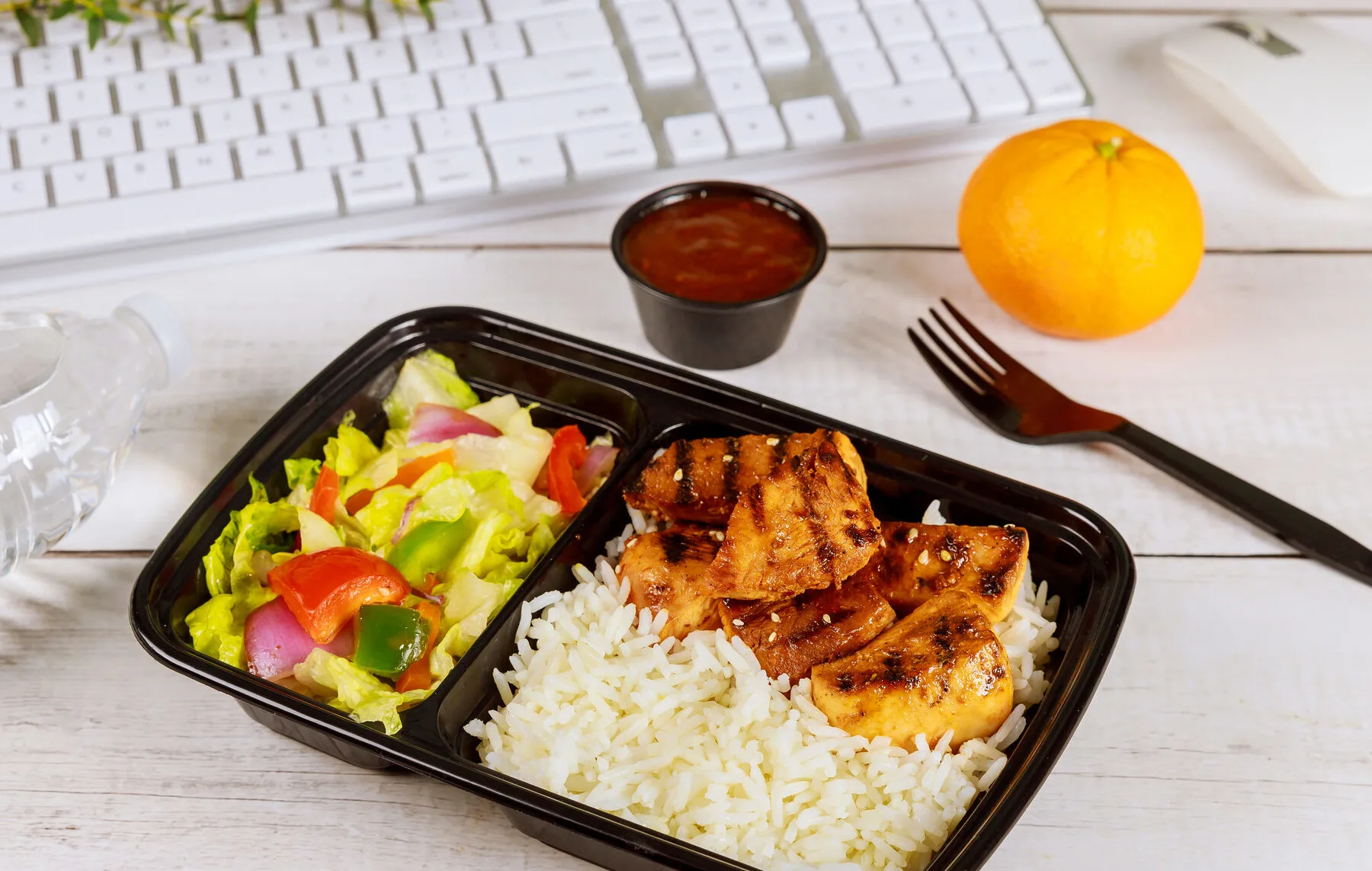To become financially free, it is essential to find ways to earn more money and spend less constantly. This means setting reachable money goals, planning your spending, and investing in things that make more money without you having to do much.
By doing this, you can slowly become more affluent and not rely on others for money. Plus, it helps you learn how to manage your money better and deal with money problems more easily.
Packing Lunch

Image Credits: Deposit Photos
Bringing your lunch and snacks like protein bars can save money by avoiding costly restaurant meals and controlling portion sizes. Packing snacks also helps resist impulse purchases and reduces the temptation to buy expensive snacks throughout the day.
Over time, these savings accumulate, leaving you with more money in your pocket. So, making this simple adjustment to your routine can significantly impact your finances.
Adjust Your Broke

Image Credits: Deposit Photos.
It is always important to keep adjusting the level for yourself. Adjust what you think your zero is. For example, If you have $1000 in the bank account, treat it like $0. $1050 is treated like $50.
Live Below Your Means

Image Credits: Deposit Photos
Living below your means is a powerful financial strategy that fosters stability and growth. You create room to save and invest by spending less than you earn, building a safety net for emergencies and future goals. For example, when earning $3000, live below your means by budgeting $2500 for essential expenses like rent and groceries and allocating the remaining $500 towards savings or paying off debt. To do this, eliminate expenses that can be eliminated.
Drink Water

Image Credits: Deposit Photos.
Opting for water over soda, alcohol, or even sparkling water is beneficial for your health and your wallet. Water is a zero-calorie, hydrating option that costs little to nothing compared to other beverages.
By choosing water, you avoid spending money on sugary drinks or alcoholic beverages, reducing your overall expenses and potential health risks associated with excessive consumption.
Make Coffee At Home

Image Credits: Deposit Photos
Brewing your own coffee at home instead of buying it daily at Starbucks can lead to significant savings over time. While a single Starbucks coffee may seem affordable, frequent purchases add up quickly. Investing in a quality coffee maker and purchasing coffee beans in bulk are initial costs that are quickly offset by the savings from avoiding daily cafe visits.
No Food Delivery Apps on Phone

Image Credits: Deposit Photos
While food delivery offers convenience, it often comes with a hefty price tag compared to dining in or takeaways. The added costs of delivery fees, service charges, and tips can significantly inflate the total bill. Opting for delivery may not be financially prudent unless time constraints prevent cooking or dining out. While it may be justified occasionally for time-saving purposes, habitual use can quickly erode savings
Make An Actual Budget

Image Credits: StockImageFactory.com, Shutterstock
Creating and sticking to a budget can help you better understand your spending habits, make informed financial decisions, and ensure you have enough money to cover your expenses and save for future goals. Without a budget, it can be difficult to keep track of your spending and prioritize your financial needs.
Pay Credit Cards On Time

Image Credits: Deposit Photos.
Paying credit card bills on time is essential for maintaining financial health and avoiding costly consequences. Timely payments help you build a positive credit history, which is crucial for securing loans, mortgages, and favorable interest rates in the future.
Late payments can result in hefty fees, increased interest rates, and damage to your credit score, making it harder to achieve your financial goals.
Use Reward Points

Image Credits: Deposit Photos
It’s wise to consider acquiring a credit card with attractive rewards and benefits. By using it for all your purchases and paying off the balance every month, you can maximize these rewards while avoiding interest charges. This approach lets you earn “free money” through cashback, travel points, or other perks provided by the credit card issuer.
Meal Prep

Image Credits: Deposit Photos
By dedicating time to plan and prepare meals in advance, you can effectively control food expenses and minimize impulsive spending on dining out or ordering takeout.
Meal prepping allows you to buy ingredients in bulk, take advantage of sales, and utilize leftovers efficiently, ultimately reducing overall food costs. Moreover, by cooking at home, you have greater control over the nutritional content of your meals, potentially leading to long-term health benefits and savings on healthcare expenses.
Buy in bulk

Image Credits: Deposit Photos
Purchasing items in larger quantities often comes with lower unit costs, leading to immediate savings on groceries, household goods, and other essentials. Additionally, buying in bulk reduces the frequency of shopping trips, saving both time and transportation costs.
By stocking up on frequently used items during sales or promotions, you can further maximize savings.
Get a side hustle

Image Credits: Deposit Photos
Having a side hustle can provide an additional source of income, help you achieve your financial goals faster, and provide opportunities for personal and professional growth. You can check out some of the best work from home jobs here.
Automate Your Savings

Image Credits: Deposit Photos.
Automating savings ensures that you consistently set aside money without thinking about it. Set up automatic transfers from your checking account to your savings account on payday. For instance, if you decide to save $100 per paycheck, automate a transfer of $50 from each paycheck to your savings account. Over time, these regular contributions will accumulate, helping you build your savings effortlessly.
Prioritize Paying off High-Interest Debt

Image Credit: Deposit Photos
High-interest debt, such as credit card debt, can accumulate rapidly due to compounding interest. Focus on paying off these debts first to minimize interest charges. For example, if you have a credit card with a 20% APR and a $1,000 balance, you could be paying $200 annually in interest. By prioritizing paying off this debt aggressively, you can save money on interest charges and become debt-free sooner.
Negotiate with Service Providers

Image Credit; Deposit Photos
Contact your service providers and inquire about available promotions or discounts. Mention competitive offers from other providers to leverage better deals. For instance, if your cable bill increases unexpectedly, call your provider to negotiate a lower rate or switch to a more affordable plan to save money.
Switch to Generic Brands

Image Credits: Deposit Photos.
Generic brands often offer quality similar to that of name brands at a lower price. Compare prices and try switching to generic alternatives for products like pantry staples, toiletries, and cleaning supplies. For example, opting for generic cereal instead of a name brand could save you $1-2 per box.
Increase Retirement Contributions

Image Credits: Deposit Photos
Take advantage of employer-sponsored retirement plans like 401(k)s or individual retirement accounts (IRAs) by contributing regularly. Aim to increase your contributions over time, especially when you receive a raise or bonus. For example, if you receive a 3% salary increase, consider allocating a portion towards your retirement contributions.
Practice delayed gratification

Image Credits: Deposit Photos
Before making major purchases, practice delaying gratification by waiting a designated period, such as 24 hours or a week, before buying. This allows you to evaluate whether the purchase is truly necessary or if it’s driven by impulse or emotion.
